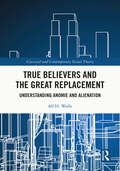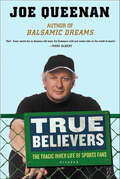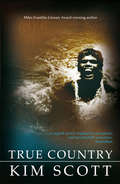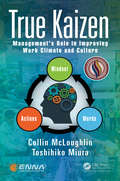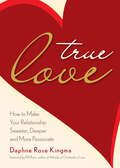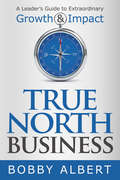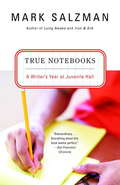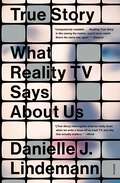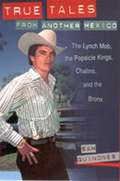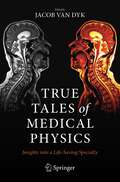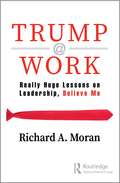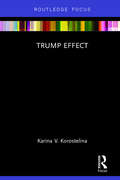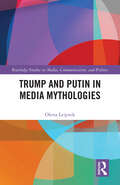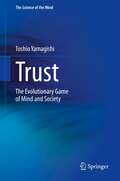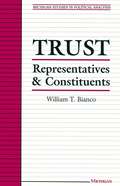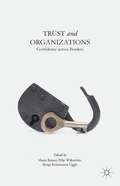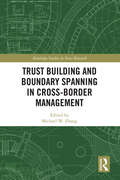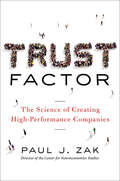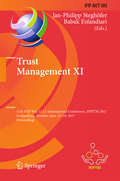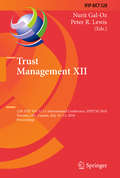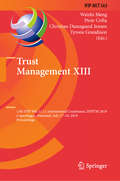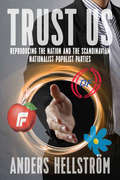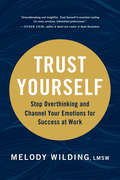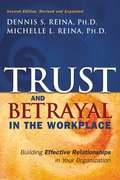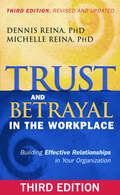- Table View
- List View
True Believers and the Great Replacement: Understanding Anomie and Alienation (Classical and Contemporary Social Theory)
by Alf H. WalleTrue Believers and the Great Replacement explores the responses of segments of Western cultures who fear that changes in the racial, religious, and ethnic makeup of society threaten their way of life. The Great Replacement Theory (that suggests that the traditional character of Western society is being undermined by outsiders) is discussed. Analysed with reference to the Critical Race Theory and the ‘Cancel Culture’ movement, the author examines the anxieties and reactions of those who feel alienated by a world of rapid and disorienting change. Drawing upon the thought of Eric Hoffer and Emile Durkheim, these responses are discussed in terms of the concepts of Anomie and the True Believer in innovative and effective ways. Based on this analysis, strategic responses are suggested. The volume will appeal to scholars and practitioners involved with issues of race and ethnicity, business and social and cultural analysis.
True Believers: The Tragic Inner Life of Sports Fans
by Joe QueenanBestselling author Joe Queenan's True Believers explores the world of sports fans in an attempt to understand the inexplicable: What does anyone get out of it?For Yankee, Cowboy, and Laker fans the answer is fairly clear: the return on investment is relatively high. But why do people root so passionately for formerly inept teams like the Boston Red Sox, the Chicago Cubs, and the Philadelphia Phillies? Why do people organize their emotional lives around lackluster franchises such as the Cleveland Cavaliers, the San Diego Padres, and the Phoenix Suns, of whom decades passed with only winning a single championship in their entire history? Is it pure tribalism? An attempt to maintain contact with one's vanished childhood? In True Believers, humorist and lifelong Philly fan Joe Queenan answers these and many other questions, shedding light on—and reveling in—the culture and psychology of his countless fellow fans. Making pilgrimages to such cradles of competition as Notre Dame Stadium, Fenway, and Wrigley Field, Queenan delves into every aspect of fandom in such illuminating chapters as Fans Who Love Too Much (men, like the author, who actually resort to psychotherapy to deal with their unhealthy addiction), Fans Who Run in Front (which meticulously delineates the differences between Retroactive, Municipal, and Vicarious Frontrunners), and Fans Who Misbehave (those who spill beer on women, moon other fans, or throw half-eaten sandwiches at innocent bystanders simply because they look like the current coach of the New York Jets). True Believers is a hilarious but also heartfelt look into the world of those fans who realize that it is, in fact, more than just a game.
True Country
by Kim ScottExamining ideas of belonging and being an outsider, this story follows Billy, a young school teacher and drifter who arrives in Australia's remote far north in search of his past, his Aboriginal roots, and his future. Through masterful language and metaphor, as well as a sophisticated tone that is both subtle and spirited, the novel finds Billy in a region not only of abundance and beauty but also of conflict, dispossession, and dislocation. On the frontier between cultures, Billy must find where he belongs in what is ultimately a powerful portrayal of the discovery of self and a sensitive exploration of race and culture.
True Kaizen: Management's Role in Improving Work Climate and Culture
by Collin McLoughlin Toshihiko MiuraWhat does it take to manage an organization to success? No matter what industry you are in, an organization is primarily a group of people. This book focuses on that ever-important human element. In the rush to get 'lean', many organizations focus solely on tools for increasing productivity, but where do these tools come from? In this book, Collin McLoughlin and Toshihiko Miura look back on their decades of international consulting experience to examine how organizations around the world have transformed on a cultural level by respecting the people who work within them and leveraging their creativity to solve problems. As our workforce becomes more knowledgeable, skillful, and more perceptive of their needs and wants as employees, the ability to reach the true potential of an organization becomes more and more difficult. Managers must look at each individual element of an equation like this in order to fully understand how to achieve an answer. They must begin to answer more focused questions, such as: 1. How productive is the existing work climate and culture? 2. How do employees, as individuals, navigate the existing work climate? (How do they deal with day-today issues with each other?) 3. Where and how are individuals and their work processes assessed? 4. What obstacles do employees face every day, and are they empowered to fix these obstacles? 5. What role does leadership play at each level of the organization? (Looking at the organization in layers of management.) To address these challenges, this book focuses on three main aspects of leadership and management: 1. Addressing and Improving the Perspective of Management -- The ideas presented in this book are not limited to a certain industry or field of work, but can be applied in any setting because they speak to a universal human element. 2. Exploring and Improving Work Climate -- Organizations are social entities, operating within their own controlled environment. This book will explore the factors that contribute to, and encourage, a positive work climate. 3. Observing and Eliminating Wasteful Work Processes -- Observing wasteful activities and work processes requires a refined perspective. The case studies presented illustrate the How and Why to help refine expertise. This will also lead to the joy and benefits
True Love: How to Make Your Relationship Sweeter, Deeper and More Passionate
by Daphne Rose KingmaLessons on Finding Love and Becoming A Power CoupleWherever you are on the relationship spectrum —married, dating, or single —you can learn about love! Expert on love and relationship oracle Daphne Rose Kingma is here to help readers love more passionately.Your go-to guide to healthy love. Love can come in many ways, and can be just as complex as it is beautiful. Relationship books for women and love gifts for men tend to focus on the end goal being something physical, but the best love stories end with something better than that —healthy love and tips to being a power couple. True Love is a spiritual love book that focuses on building the foundations of love and how to experience a healthy love within all of your relationships, including the relationship you have with yourself.A warm and welcoming voice from an expert on love. Daphne Rose Kingma knows what it takes to experience deep love and how to become a real-life power couple. Her witty, poetic voice, recognizable from her frequent appearances on The Oprah Winfrey Show, helps couples and individuals to embrace passionate marriages and deep relationships. Read her keys to creating sweet, healthy marriages and relationships right here!Inside True Love, you’ll find:Over sixty insights for expanding your view on healthy loveInstructions on how to be a true power couple from an expert on loveA source for understanding love, relationship help, and how to give and receive love and respect, devotion, and moreIf you enjoy love books —best sellers like The Naked Marriage, Married Roommates, or Modern Love, you’ll love True Love.
True North Business: A Leader’s Guide to Extraordinary Growth and Impact
by Bobby AlbertGoogling and guessing are not good leadership strategies.Another landmark leadership book by Bobby Albert, True North Business provides the compass and roadmap required for the journey to meaningful success. Let&’s face it, the marketplace is more competitive and bewildering than ever. Leaders need a proven way to confidently chart their path and lead their people.In True North Business, Bobby presents the True North principles that equip today&’s leaders to create their True North Compass—a rock-solid reference that allows them to authentically lead with confidence. Readers discover the problem that threatens every leader and a simple process to avoid it, along with ways to make better decisions and stimulate the growth they&’ve always dreamed of.
True Notebooks
by Mark SalzmanIn 1997 Mark Salzman, bestselling author Iron and Silk and Lying Awake, paid a reluctant visit to a writing class at L.A.'s Central Juvenile Hall, a lockup for violent teenage offenders, many of them charged with murder. What he found so moved and astonished him that he began to teach there regularly. In voices of indelible emotional presence, the boys write about what led them to crime and about the lives that stretch ahead of them behind bars. We see them coming to terms with their crime-ridden pasts and searching for a reason to believe in their future selves. Insightful, comic, honest and tragic, True Notebooks is an object lesson in the redemptive power of writing.From the Trade Paperback edition.nlightening, and ultimately hopeful--driven by the insight and humor of Salzman's voice and by the intelligence, candor, and strength of his students, whose writing appears throughout the book--True Notebooks is itself a reward of the self-expression Mark Salzman teaches: a revelatory meditation on the process, power, and meaning of writing.From the Hardcover edition.
True Story: What Reality TV Says About Us
by Danielle J. LindemannNamed a Best Nonfiction Book of 2022 by EsquireA sociological study of reality TV that explores its rise as a culture-dominating medium—and what the genre reveals about our attitudes toward race, gender, class, and sexualityWhat do we see when we watch reality television?In True Story: What Reality TV Says About Us, the sociologist and TV-lover Danielle J. Lindemann takes a long, hard look in the “funhouse mirror” of this genre. From the first episodes of The Real World to countless rose ceremonies to the White House, reality TV has not just remade our entertainment and cultural landscape (which it undeniably has). Reality TV, Lindemann argues, uniquely reflects our everyday experiences and social topography back to us. Applying scholarly research—including studies of inequality, culture, and deviance—to specific shows, Lindemann layers sharp insights with social theory, humor, pop cultural references, and anecdotes from her own life to show us who we really are.By taking reality TV seriously, True Story argues, we can better understand key institutions (like families, schools, and prisons) and broad social constructs (such as gender, race, class, and sexuality). From The Bachelor to Real Housewives to COPS and more (so much more!), reality programming unveils the major circuits of power that organize our lives—and the extent to which our own realities are, in fact, socially constructed.Whether we’re watching conniving Survivor contestants or three-year-old beauty queens, these “guilty pleasures” underscore how conservative our society remains, and how steadfastly we cling to our notions about who or what counts as legitimate or “real.” At once an entertaining chronicle of reality TV obsession and a pioneering work of sociology, True Story holds up a mirror to our society: the reflection may not always be pretty—but we can’t look away.
True Tales From Another Mexico: The Lynch Mob, the Popsicle Kings, Chalino, and the Bronx
by Sam QuinonesQuinones in his search for an authentic modern Mexico explores the stories of emigrants and ignored margins of society.
True Tales of Medical Physics: Insights into a Life-Saving Specialty
by Jacob Van DykSince the discovery of the x-ray over 125 years ago, scientists and medical professionals alike have harnessed the power of the atom to heal and protect. This book brings together an all-star cast of high-profile and award-winning scholars, introducing the general readership to an often unnoticed yet societally vital profession – medical physics. This collection of personal short stories offers an informal, behind-the-scenes glimpse into the lives of these esteemed professionals, encapsulating their transformative “aha” moments within a whimsical hodgepodge of instructive and inspiring anecdotes. They even pass on words of wisdom discovered from their diverse experiences throughout the academic, clinical, and commercial worlds. The wealth of information packed into these vignettes runs the gamut from practical career advice to lighthearted tales of humorous misadventure, providing a tremendous overview of the breadth and depth of medical physics as a career and discipline while imparting sage advice that extends well beyond the field. In his Foreword to this book Rafael Grossi, Director General of the International Atomic Energy Agency, provides his strong endorsement of the life-saving work carried out by medical physicists and the profession as a whole.From the general public to the budding student in search of career guidance, as well as young and seasoned practicing professionals, these thought-provoking, witty, and simply entertaining “untold stories” encourage the reader to reflect on and ponder the many enduring lessons born from unexpected life-turning events.
Trump @ Work: Really Huge Lessons on Leadership, Believe Me
by Richard A. Moran"Unprecedented" is the adjective most often ascribed to everything about Donald Trump. Trump @ Work is about the unprecedented impact that Donald Trump and his Presidency and style has had on attitudes and perceptions of leadership and management. This book brings a unique perspective about what has changed and what has not changed through humorous and true "bullets" and observations. Why do some leaders get fired for things that other leaders boast about? In spite of controversy, why do some initiatives still get implemented? Is implementation all that matters? Is empathy and credibility still critical to success? Why aren’t there any instruction manuals about how to navigate the new workplace? These are not questions raised by just a few. These are questions everyone in the workplace is asking. Trump @ Work explores these questions and many more. It reveals how the rules of the game have changed for everyone seeking success or at least, to survive. It’s hard enough to keep up with leadership and management trends. Donald Trump is making it more difficult, not intentionally, not through the tweets he writes, but by how he is challenging the long existing norms. Who knew that tweeting would become an established way of communicating to an organization? Who knew that in spite of constant searing criticism, one can disregard it and continue to follow an agenda? Who knew that preaching to supporters and ignoring naysayers is a way to manage? Whether you appreciate Donald Trump or not, he has had an impact on the thinking about leadership and management and the author precisely explores that impact in this book.
Trump Effect
by Karina V. KorostelinaProfessor Karina V. Korostelina presents insights into the "Trump effect" and explains how the support for Trump among the American general public is based on three complementary pillars. First, Trump champions a specific conception of American national identity that empowers his supporters. Second, Trump's leadership has, to an extent, been crafted from his ability to recognize where and with whom he can get the most return on his investment (e.g. his political comments) and address the perceived general malaise in the U.S. Trump also mirrors the emotions of a disenfranchised American public, and inspires the use of frustration based anger and insults to achieve desired aims. He addresses the public’s intolerance of uncertainty and ambivalence by providing simpler solutions to complex national problems and by blurring the boundary betweent he leading political parties. Further, Trump employs existing political polarization and has established a new kind of morality. Third, Trump challenges the existing political balance of power within the U.S. and globally. The overarching goal of this book is to show how the popularity of Trump has revealed substantial problems in the social, political, and economic fabric of American life. Aimed at the general public and students in the U.S. and internationally, the book goes beyond many explanations of the "Trump Effect". Using a multidisciplinary theoretical lens, it provides a systemic multifaceted analysis based on multiple theories of social identity, emotions, cognitions, morality, and power to explain the broader social phenomena of the rise of individuals in society.
Trump and Putin in Media Mythologies (Routledge Studies in Media, Communication, and Politics)
by Olena LeipnikTrump and Putin in Media Mythologies provides an account of the media portrayal of two presidents—Donald Trump of the United States and Vladimir Putin of the Russian Federation—as mythologized figures.The book delineates the mythologizing strategies media employ to build these two leaders’ narratives and the logic of mythologization of the overall political process. It addresses the construction of the two presidential imageries and the political and cultural needs fulfilled by the archetypes they embody. The volume provides a comparative analysis of two culture-specific narrating strategies that resonate with the two—American and Russian—electorates.This interdisciplinary account combines the areas of media studies, myth studies, political anthropology, and cultural studies. It will also be an essential read for scholars and graduate students interested in political communication, public relations, and cognitive marketing.
Trust
by Toshio YamagishiThis book is written around the central message that collectivist societies produce security, but destroy trust. In collectivist societies, people are connected through networks of strong personal ties where the behavior of all agents is constantly monitored and controlled. As a result, individuals in collectivist networks are assured that others will abide by social norms, and gain a sense of security erroneously thought of as "trust." However, this book argues that this security is not truly trust, based on beliefs regarding the integrity of others, but assurance, based on the system of mutual control within the network. In collectivist societies, security is assured insofar as people stay within the network, but people do not trust in the benevolence of human nature. On the one hand, transaction costs are reduced within collectivist networks, as once accepted into a network the risk of being maltreated is minimized. However, joining the network requires individuals to pay opportunity cost, that is, they pay a cost by forgoing potentially superior opportunities outside the security of the network. In this era of globalization, people from traditionally collectivistic societies face the challenge of learning how to free themselves from the security of such collectivistic networks in order to explore the opportunities open to them elsewhere. This book presents research investigating how the minds of individuals are shaped by the conflict between maintaining security inside closed networks of strong ties, and venturing outside of the network to seek out new opportunities.
Trust And Organizations
by Marta Reuter Filip Wijkström Bengt Kristensson UgglaAn increasing number of people work in organizations that 'trade in trust'. Institutions such as banks, accounting firms, schools, and hospitals require customers, students, and patients to have confidence in the experience and professional expertise of the staff, as well as in the effectiveness of the regulations, rules, and systems in place for quality control. What mechanisms have developed in modern society to create, manage, maintain, and convey trust in companies, public administrations, and civil society organizations? What takes place in the encounter between different cultures of confidence and what happens when confidence in or between organizations is shattered?Trust and Organizations gathers an interdisciplinary group of academics to contextualize the dilemmas resulting from the institutionalization of trust and confidence in a wide selection of organizational settings. The importance of trust is highlighted in relation to different types of borders or boundaries - institutional, organizational, and geographical - as the overlapping and blurring of such boundaries is becoming one of the main characteristics of an increasingly transnational and re-regulated world.
Trust Building and Boundary Spanning in Cross-Border Management (Routledge Studies in Trust Research)
by Michael ZhangThis edited book addresses two critical issues in international management: building trust and managing boundary spanning activities between international business partners. The duel-process of internationalization of multinational corporations (MNCs), through globalisation and regionalisation, has helped MNCs to increase their market expansion and improve the capabilities of innovation and learning. By creating various forms of international strategic alliances (ISAs), MNCs have become structurally more complex and geographically more dispersed. As a result, MNCs in general and ISAs in particular face the challenges of discerning blurred organisational boundaries, reconfiguring the control mechanisms, integrating diversified resources, and coordinating distributed activities in time and space. Research in organisation behaviour indicates that boundary spanners play critical yet unspecified roles and functions in managing cross-boundary relationships. A core boundary spanning function is to build trust relationships. When organisations engage in business transactions, members of the organisations are concerned with not only the outcomes of economic transactions but also the processes of social exchanges. Boundary spanners may succeed in building interpersonal trust in a partnership, nonetheless their effort may not lead to inter-partner trust without an effective implementation of the institutionalisation process. Whereas trustworthiness is the antecedent to trust providing the basis for trust to develop, distrust manifests itself as a separate and linked concept to trust. These dynamic features of trust, trustworthiness, and distrust are critically elaborated. Trust Building and Boundary Spanning in Cross-Border Management is dedicated to explicating these under-researched themes and contributing to the emerging streams of research in micro foundations and micro-structural approaches. It illustrates the latest research on the topic and will be of interest to both students at an advanced level, academics and reflective practitioners in the fields of organisational behaviour and theory, strategic management, international strategy and strategic alliances.
Trust Factor: The Science of Creating High-Performance Companies
by Paul J. ZakWhy is the culture of a stagnant workplace so difficult to improve? Learn to cultivate a workplace where trust, joy, and commitment compounds naturally by harnessing the power of neurochemistry!For decades, business leaders have been equipping themselves with every book, philosophy, reward, and program, yet companies everywhere continue to struggle with toxic cultures, and the unhappiness and low productivity that go with them.In Trust Factor, neuroscientist Paul Zak shows that innate brain functions hold the answers we&’ve been looking for. Put simply, the key to providing an engaging, encouraging, positive culture that keeps your employees energized is trust. When someone shows you trust, a feel-good jolt of oxytocin surges through your brain and triggers you to reciprocate.Within this book, Zak explains topics such as:How brain chemicals affect behaviorWhy trust gets squashedHow to stimulate trust within your employeesAnd much more!This book also incorporates science-based insights for building high-trust organizations with successful examples from The Container Store, Zappos, and Herman Miller.Stop recycling the same ineffective strategies and programs for improving culture. By using the simple mechanisms in Trust Factor, you can create a perpetual trust-building cycle between your management and staff, thus ending stubborn workplace patterns.
Trust Management XI: 11th IFIP WG 11.11 International Conference, IFIPTM 2017, Gothenburg, Sweden, June 12-16, 2017, Proceedings (IFIP Advances in Information and Communication Technology #505)
by Jan-Philipp Steghöfer and Babak EsfandiariThis book constitutes the refereed proceedings of the 11th IFIP WG 11.11 International Conference on Trust Management, IFIPTM 2017, held in Gothenburg, Sweden, in June 2017. The 8 revised full papers and 6 short papers presented were carefully reviewed and selected from 29 submissions. The papers are organized in the following topical sections: information sharing and personal data; novel sources of trust and trust information; applications of trust; trust metrics; and reputation systems. Also included is the 2017 William Winsborough commemorative address and three short IFIPTM 2017 graduate symposium presentations.
Trust Management XII: 12th IFIP WG 11.11 International Conference, IFIPTM 2018, Toronto, ON, Canada, July 10–13, 2018, Proceedings (IFIP Advances in Information and Communication Technology #528)
by Peter R. Lewis Nurit Gal-OzThis book constitutes the refereed proceedings of the 12th IFIP WG 11.11 International Conference on Trust Management, IFIPTM 2018, held in Toronto, ON, Canada, in July 2018.The 7 revised full papers and 3 short papers presented were carefully reviewed and selected from 22 submissions. The papers feature both theoretical research and real-world case studies and cover the following topical areas: trust in information technology; socio-technical, economic, and sociological trust; trust and reputation management systems; identity management and trust; secure, trustworthy and privacy-aware systems; trust building in large scale systems; and trustworthyness of adaptive systems. Also included is the 2018 William Winsborough commemorative address.
Trust Management XIII: 13th IFIP WG 11.11 International Conference, IFIPTM 2019, Copenhagen, Denmark, July 17-19, 2019, Proceedings (IFIP Advances in Information and Communication Technology #563)
by Christian Damsgaard Jensen Weizhi Meng Piotr Cofta Tyrone GrandisonThis book constitutes the refereed proceedings of the 13th IFIP WG 11.11 International Conference on Trust Management, IFIPTM 2019, held in Copenhagen, Denmark, in July 2019.The 7 revised full papers, 3 short papers, and 6 work-in-progress papers presented were carefully reviewed and selected from 32 submissions. The papers cover a broad range of topics related to trust, security and privacy and focus on trust in information technology and identity management, socio-technical and sociological trust, and emerging technology for trust.
Trust Us: Reproducing the Nation and the Scandinavian Nationalist Populist Parties
by Anders HellströmIn Scandinavia, there is separation in the electorate between those who embrace diversity and those who wish for tighter bonds between people and nation. <P><P>This book focuses on three nationalist populist parties in Scandinavia-the Sweden Democrats, the Progress Party in Norway, and the Danish People's Party. In order to affect domestic politics by addressing this conflict of diversity versus homogeneity, these parties must enter the national parliament while earning the nation's trust. Of the three, the Sweden Democrats have yet to earn the trust of the mainstream, leading to polarized and emotionally driven public debate that raises the question of national identity and what is understood as the common man.
Trust Yourself: Stop Overthinking and Channel Your Emotions for Success at Work
by Melody Wilding LMSWAre you a Sensitive Striver? Learn how to get out of your own way and rediscover your sensitivity as a superpower.___ Highly sensitive and high performing?___ Need time to think through decisions before you act?___ Judge yourself harshly when you make mistakes?___ Take feedback and criticism personally?___ Find it difficult to set boundaries?It's time to Trust Yourself. Being highly attuned to your emotions, your environment, and the behavior of others can be the keys to success, but they can also lead to overthinking everything and burnout. Human behavior expert and executive coach Melody Wilding, LMSW has spent the past ten years working with Sensitive Strivers like you. In this groundbreaking book, she draws on decades of research and client work to examine the intersection of sensitivity and achievement in the workplace and offer neuroscience-based strategies you can use to reclaim control of your life and reach your full potential.Trust Yourself offers concrete steps to help you break free from stress, perfectionism, and self-doubt so you can find the confidence to work and lead effectively. You will learn how to:• Achieve confidence and overcome imposter syndrome.• Find your voice to speak and act with assertiveness.• Build resilience and bounce back from setbacks.• Enjoy your success without sacrificing your well-being.If you're an empathetic, driven person trying to navigate your career and learn how to believe in yourself in the process, Trust Yourself offers the mindset and tools to set you on the path to personal and professional fulfillment.The perfect book for:• Those who identify as highly sensitive• Anyone who overthinks or struggles with work stress and burnout•Corporate professionals of all levels• Managers, leaders, and executives• Life, career, and leadership coaches
Trust and Betrayal in the Workplace
by Dennis S. Reina Michelle L. ReinaMore than ever, there is a need for trust in the workplace. After all, business is conducted via relationships, and trust is the foundation to effective relationships. Yet, trust means different things to different people and this is a big part of the problem. Collectively drawing on thirty years of research and experience with organizations around the world, Dennis and Michelle Reina put people on the same page. The Reinas provide a simple and comprehensive approach that works! Their approach outlines a common language to discuss trust constructively, identifies specific behaviors that build and break trust, and it describes steps for rebuilding trust and sustaining it over time, even during periods of change. Trust takes time to develop; it is easy to lose and hard to regain. It is a fragile yet indispensable element in any relationship. Betrayal, or the loss of trust, is the focus of countless fiscal scandals, all of which ultimately resulted from a lapse in trust. However, it is not just these major lapses of integrity that break trust. Trust is broken in subtle ways every day in every workplace. As a result, countless numbers of people in the workplace today are in pain, and many organizations are hurting. After years of constant change--downsizing, restructuring, or of mergers and acquisition--trust among people in organization is at an all-time low. We have all felt the pain of a breach of trust or even a betrayal during the course of our working careers. Unmet expectations, disappointments, broken trust, and betrayals aren't restricted to big events like restructurings and downsizings. They crop up every day on the job. The Reina's show us the shape and form betrayal takes, its impact on relationships and performance, and most importantly what we can do to rebuild trust. Trust & Betrayal in the Workplace helps us see the natural role trust and betrayal plays in our lives, how we can rebuild trust and transform workplace relationships. It provides new examples, highly practical tips, tools, and exercises to help readers create work environments where trust grows, where people feel good about what they do, where relationships are energized, and productivity and profits accelerate.
Trust and Betrayal in the Workplace: Building Effective Relationships in Your Organization
by Dennis Reina Michelle ReinaThis new edition of a classic, bestselling book has been revised and updated throughout and includes a new chapter on Forgiveness in the Workplace
